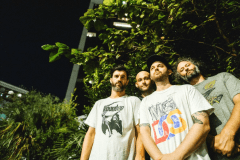For a moment I thought, like everyone else I’m sure, that we were still in December. Oh, I’ve been diligent about writing 2020 rather than 2019 but it’s just the month that’s caused me confusion for some reason. Is it just me? Possibly. Working 60 hours a week at times will sometimes do that to you. No, that’s not a complaint because I enjoy everything I do. If I didn’t I’d probably drive myself crazy.
I’ve never considered myself a connoisseur of stoner rock / stoner metal and its ilk, but whenever something has come across my desk that appeals to me, it appeals to me. As an example, let’s talk about Val Tvoar for a moment. Originally hailing from the land of Estonia, the multi-instrumentalist, and founder of bands Soul Thrower and Human Ground, lived in Hollywood, CA for a time. Not a surprise there, but what is surprising is that Tvoar has a handful of releases under his own name.
For Today Is Tomorrow’s Yesterday (Heliaed Records), Tvoar played and recorded all the instruments, which leads me to believe there’s more to him than we all may know. For one thing, the album, while it may fit under the genre, its reach is extensive and far outstretches the subgenre. Sure, the band starts things with “Dark Sun,” which is heavy on rhythms and explosiveness with guitars bombarding senses from every direction. Tvoar keeps his vocal delivery tightly wound together with the rhythm which works to his benefit. He moves frenetically on the quick-paced “The Preacher,” and when he sings “The view from six-feet under / You’re able to see your life all over” gives the dark imagery and intent on the song’s direction and I welcome it! It’s refreshing to get clarity from the get-go, along with a bombastic delivery of instruments clashing against one another.
The obvious choice in song here would be “Unchained,” with its clear catch AF melodies and seamless and controlled delivery. This is the perfect storm. But it’s Tvoar’s songwriting and instrument wizardry that I’m left in awe of. “Eternity Ends Here” is one of the greatest songs that could probably make Metallica blush. It’s obscenely that good. Given, on this album, there may be things that are reminiscent of things other bands have made popular, but Val Tvoar does things just as good, if not better. The title track itself runs circles around any comers far and near and I’m sure there aren’t many that would want to go up against him. The album closes with the balladesque “Another Sad Season” which shifts gears into a monstrosity of a song.
I’m left wondering why Val Tvoar isn’t a household name because Today Is Tomorrow’s Yesterday is such a powerful endeavor.
Facebook | Twitter | Instagram
Sitting here attempting to make sense of things, but life isn’t that confusing, and music even less so. Coming across my desk is Making A New World (Memphis Industries), the new album by the UK’s Field Music, and the group’s 7th album. Together now for 16 years, the band is an art-rock of a different sort. Within the confines of the album, they tend to include brief excursions or just short tracks, you decide, and it sometimes seems as if the members worked on an idea and then decided not to finish fleshing them out. “From A Dream, Into My Arms” could give you an idea. At 1:20 minutes, the band edges along with sweet harmonies and melodies before it seems to abruptly end. While it was beautifully done, listeners, like myself would probably want to hear much more. But when the band does expand on things, I’m left in awe.
The sweet pop sensibilities of “A Change Of Heir” morphs into “Do You Read Me,” an upbeat number that’s stark, yet filled with so much instrumentation, melody, and harmonies. It’s handsomely crafted, with imagery that seems to collide into itself. After listening to this track it’s clear the band is direct in its indirect approach to music. They feel, they see, they hear, and let it take the band in whichever direction the song chooses. It’s fascinating.
It’s so easy to fall in love with Field Music as I listen to “Coffee or Wine” which beings with percussion and a solitary piano before the bass chimes in. The Brewis brothers, who lead the band are masters at their craft creating delectable harmonies and beauty all around. There’s no singular direction the band should be expected to go in, it’s always quite surprising, much like “Best Kept Garden.” The song pulls some of the best harmonies and melodies Lennon/McCartney never wrote, wrapping guitar and bass lines all around them.
Listening to Making A New World leaves me appalled that more people haven’t listened to the band because this is in fact, an amazing piece of work.
Facebook | Twitter | Instagram
After a few albums, it usually seems an artist has nothing much to prove to its audience except by creating a raucous racket if that’s in fact what a group has been known for. But of course, appeasing fans is necessary if that’s the reason they do what they do. Now while I’m sure Beach Slang is appreciative of the growing ranks in its fanbase, it sounds like they’re doing it for themselves as well.
In essence, The Deadbeat Bang Of Heartbreak City (Bridge Nine) is the group’s third full-length, that is if we don’t count its release as Quiet Slang. Led by vocalist/guitarist James Alex Snyder, the band’s new offering is a hodgepodge of sound that’s probably the band’s most realized work to date. Kicking out the jams here with “All The Kids In LA,” which begins with string arrangements before shifting sonically into an all-out rawk fest which leaves images of late 70s Detroit Rock City dancing in my head. Guitars are turned up to 11, drums obliterate everything in its path, leading the way to “Let It Ride.” One thing the band never runs short on is driving its songs with clear melodies that are catchy AF at every turn. Given, when the band hits the chorus here, they can’t deny their influences because it’s reminiscent of The Replacements. Make no mistake though, I’m sure Snyder would welcome the ode considering Tommy Stinson handles bass duties here on much of the release.
Beach Slang pays ode to another influence (Tommy Keene) in “Tommy In The 80s” where Snyder sings barely raising his voice through a rasp that fits the song’s aesthetic which is based in repetition, without sounding repetitive. It’s right after this point, as soon as “Nobody Say Nothing” begins when and where I need to make note that the band’s alter-ego may no longer be a necessity as this Slang incorporates hushed songwriting utilizing strings and acoustic guitars. It’s juxtaposed well against the much louder side of the group’s wall of guitar barrage and obviously welcomed. The song blends seamlessly into “Nowhere Bus,” which has the same melody as the previous track(?). Odd, but I’m sure Beach Slang will find little to no resistance in meshing the soft with the louder side of the band. And they do sometimes get loud!
With the in-your-face “Born To Raise Hell” the band is sure to have followers bouncing off walls, while “Sticky Thumbs,” continues the barrage with non-stop fervor of sound. Yeah, this is the way loud rock is supposed to sound, and it’s capitalized on “Kicking Over Bottles,” where the band shifts dynamics and guitars are the prominent instruments here with so much synchronicity and edge to them. It makes it so easy to love the band. Beach Slang end things with the beautiful “Bar No One,” a funeral dirge accentuated by piano and strings and when Snyder sings, “Make sure I look pretty laying in my grave,” his somber tone makes one want to rejoice and cry at the same time.
The Deadbeat Bang Of Heartbreak City, to say the least, is a powerful record that takes you on a rollercoaster of emotion, which can allow some to relive their youth and come to terms with life in general. I’m left in awe with how the band was able to accomplish that here.








Social Media